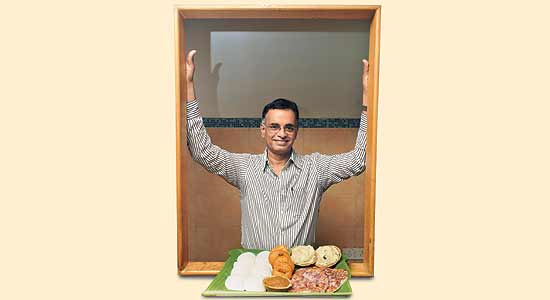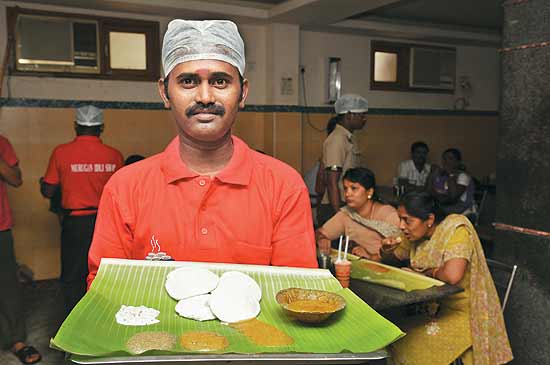
RA CHANDROO
Even as a child it was my dream to run the shop, but my family felt the physical labour was not suited
to educated people. —S Manoharan, Owner, Murugan Idli Kadai
|
A Steaming Success
It started as small pavement shop in Madurai. Now Murugan Idli has
become a destination for South Indian fast food in Tamil Nadu and abroad.
If his parents had their way, S Manoharan would never have set foot inside a kitchen. “They wanted me to join a bank or become a professor,” laughs the 52-year-old proprietor of Murugan Idli Kadai. Instead, Manoharan tucked away his law degree to take over the reins at the small coffee shop run by his parents in Madurai—and transformed it into a fast food chain that has branches in Madurai, Chennai and even Singapore, clocked revenues of Rs 25 crore last year and is now eyeing markets in North and West of India.
Every day, Murugan Idli Kadai churns out 25,000 idlis at its 13 outlets in Tamil Nadu (one in Singapore). At any time of day or night, there’s likely to be a queue waiting to be seated—waiting half an hour to 45 minutes at peak times is commonplace. And while most patrons ask almost automatically for Murugan’s trademark supersoft idlis and variety of chutneys, the menu has expanded to offer other traditional South Indian snacks. Not a mean feat for an eatery that started as a pavement stall.
The Inception
The foundations of Murugan Idli lie in a roadside shop that Manoharan’s mother set up in the 1960s as a way to supplement the family income. The stall was nothing fancy, Manoharan recalls. “My mother sold only idlis with two kinds of chutneys and no sambhar.” But even the limited menu proved to be a big hit—Manoharan remembers then Chief Minister K Kamaraj driving past and, on seeing the crowd gathered there, stopped to eat idlis. By the 1970s, the stall had expanded into a small, permanent shop named Murugan Coffee Nilayam after the family deity, but the menu remained unchanged.
Manoharan came on board in 1993, after completing his education and against the wishes of his family. “Even as a child it was my dream to run the shop, but my parents and my siblings felt the physical labour involved was not suited to educated people. But I was adamant,” he says. Once he took over, he added more seating capacity and modernised the interiors. The store was rechristened Murugan Idli Kadai and the menu expanded beyond idlis to include other “tiffin items” such as chakkarai pongal, dosas, vadas, more chutneys and sambhar.

|
Meanwhile, he’s not hesitated to venture outside India. In 2008, Murugan Idli Kadai opened a branch in Singapore, strategically located in Little India, opposite department store Mustafa’s. The sizeable Tamil and Indian expat population in Singapore ensured the eatery’s success. “There was a queue outside on the day we opened,” Manoharan says with pride.
The USP
What makes Murugan Idli successful in a region that’s stuffed to the gills with South Indian restaurants? Manoharan believes the quality of the food and the traditional service at Murugan Idli is the differentiator. While restaurants are managed independently, food is cooked in a central kitchen to ensure standardisation and maintain quality. All food is served on banana leaves and waiters offer you unlimited quantities of chutney and sambhar, “just the way your mother serves you at home,” he adds.
Importantly, the chain has also stuck to what it does best—traditional South Indian snacks. In contrast, local rivals like Saravana Bhavan and Apoorva Sangeetha have book-sized menus that include North Indian and Chinese dishes and even pizzas and burgers—of course, that variety has also been responsible for the faster growth and higher revenues of these chains. Says a Chennai-based market research professional, “Murugan Idli Kadai has not fallen into the trap of serving everything from Chinese to chaat, maintaining its standard and quality.”
Since a lot rides on the quality of the eponymous idlis, the proportion of rice and dal in the batter is kept secret. So is the special brew of “degree coffee” served at the restaurant. The menu has been developed entirely by Manoharan, based on his mother’s recipes—“I have added one or two innovations that make them unique,” he says, adding that competitors have tried to copy the recipes, unsuccessfully.
Murugan’s USP perhaps is that here, traditional South Indian doesn’t mean just idli-dosa-vadacombination. Jigarthanda and onion uttapam are house specialities that are unique to Murugan Idli. Since the shallots for the uttapam have to be painstakingly peeled by hand, Murugan has about 20 employees in Madurai who do this task exclusively for the central kitchen in Chennai.Jigarthanda, too, is a Madurai speciality that Manoharan has tweaked; roughly translating as “liver cooling”, the drink—somewhat similar to Mumbai’s falooda and Southeast Asia’s bubble tea—is said to have been invented by the Muslim rulers of the region. “You can’t get this anywhere else in Chennai,” he claims.
Spread Out
And now Manoharan is eyeing the rest of the country. In the next year, Murugan Idli will open a branch each in Delhi and Mumbai with ambitious plans of opening 300 branches across India in 10 years. The choice of location will depend on its proximity to shopping areas and the Delhi branch is most likely to be in the heart of the city, at Connaught Place. Akther Ghori, CEO of Chennai-based brand management and marketing consultancy Rosette Consulting, believes that’s a sound strategy. “South Indian food is popular in the North and there is a sizeable population of South Indians in Mumbai and Delhi. That should work to Murugan Idli’s advantage,” she adds, pointing to the success of the Singapore outlet as proof.
Manoharan is clear expansions will be only through the ownership route, worrying that the current stringent levels of quality control may be compromised in the franchise route. On an average, it costs Rs 50 lakh to set up a new branch and about two years to break even. On the anvil are plans to incorporate Murugan Idli as a private limited company and float an IPO some time in the future.
That will help finance some of Manoharan’s other plans to leverage the popularity of the Murugan Idli Kadai brand—a foray into the packaged foods business. “Our idlis are so popular that we are constantly barraged with requests for our idli podi (dal-and-spices powder accompaniment) and idli batter,” he says. As a pilot, the idli podi is being sold in the restaurants under the Murugan Idli Kadai brand, with plans to launch more products. At a later date, the products may find their way to supermarket shelves too. “As a brand, Murugan Idli Kadai commands a great degree of popularity in South India. Selling packaged idli batter etc, should be a success because it is a logical extension of their core competence,” says Rosette’s Ghori.
So far Murugan Idli Kadai has spent little or nothing on advertising. That will have to change once it enters the highly competitive packaged foods business. Perhaps that will also help in establishing Murugan Idli’s unique identity—Manoharan is already fighting out a couple of cases of copyright infringement. Still, these are minor irritants in a future that’s looking fruitful and abundant. And unlike his parents, Manoharan is looking forward to sharing it with his son.






Really its a great blog and thanks for sharing the information with us.
ReplyDeleteCoffee Shops Malleswaram Bangalore